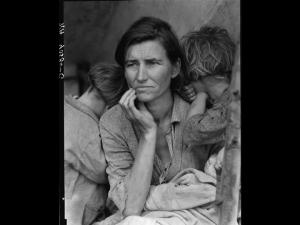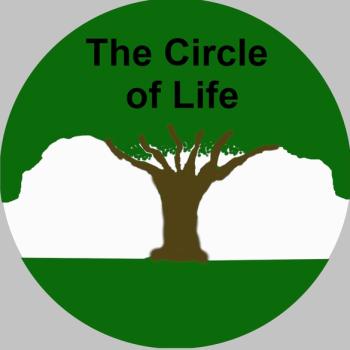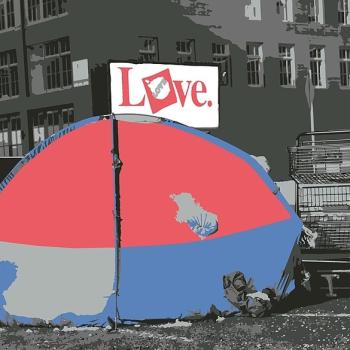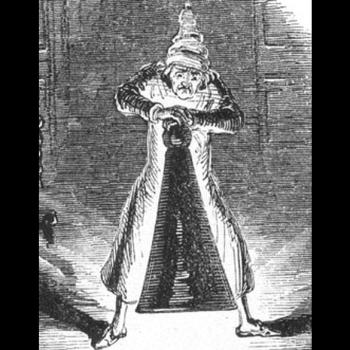It’s the 1930s Dust Bowl, all over again.

1936.
The lusty strains of Benny Goodman’s orchestra fill a Santa Barbara café, nourished by the variegated aroma of coffee, bacon and citrus bloom. A man pushes aside a plate of half-eaten special, lights up a smoke and grabs the morning paper. Inside, he discovers a black and white photo.
Greasy Dust Bowl farmer, shirtless with worn overalls.
Exhausted wife with baby in tow.
A passel of kids.
The sagging porch of a derelict shack.
A wasteland of dead trees and sterile dirt.
The Californian grimaces. In his mind, he hears Dust Bowl Pa saying, “Cain’t wreck this land no worse than we already done. I hear they got free money out west, falling from trees. Pack up, kin folk. Time to freeload off them rich Californians.”
“Just look at them,” says the Californian with a sneer. “Eating stolen watermelons, sitting there scratching their lice and scabs.”
He feels the bile rising in his throat.
“Damn Okies,” he jeers.
The slur oozes up from his gut and spills out his face, burning with caustic overtones of greed, sloth, dirt, disease, depravity and fear.
Damn Okies.
“Lazy sons-a-bitches comin’ to wreck our land.”
The article explains how Arizonans are mad as adders that Californians are turning back hundreds of dirty hoboes at the California-Arizona border. Nobody wants the Okies, but nobody bothers asking them why they’re here. If they did, they’d get an earful of truth about corrupt politicians, greedy banks, scandalous farm bureaus and catastrophic soil management policies. When hot winds swept the farms out to sea, folks didn’t know who to blame.
So they blamed the Okies.
That’s when folk who could took Route 66 west. Those who couldn’t stayed behind to fertilize the barren soil with their wasted carcasses. Unfortunately, the optimistic Okies who made it to California got their second kick to the crotch.
“Go home,” they were told.
Ha.
As if an Okie had anywhere to call home.
Just goes to show you how some things don’t change.
===================================================
Fast forward.
The peppy vibes of a jazz quartet fill a suburban café. You push aside your half-eaten breakfast, grab your smartphone and read the latest headline.
“Hundreds Arrested in ICE Raids.”
There’s a photo of the usual suspects and the racial slurs flood your mind as if from a broken levee.
Illegal aliens.
Lazy bastards.
Wetbacks come to steal our jobs.
Don’t even bother learning the language.
The words reek of greed, sloth, dirt, disease, depravity and fear.
Some things will never change, no matter how “civilized” we become.
===================================================
Close your eyes and imagine Dust Bowls in far-off places like Yemen, Iraq, Afghanistan or Somalia. See the dust stirred up by war and climate change. See good families trying to raise goats, dates or grain. See them run off not by corrupt banks and farm policies, but by greedy international politics.
See a fleet of monsters pushing these people off their land — not Depression-era dust storms and tractors, but tanks, armies, corrupt politicians, draught and oppressive heat. Watch their homes, gardens and neighborhoods turn to toxic rubble. See survivors lose their families and start walking.
Watch these “faceless” dynamics destabilize communities in rainforests, savannahs, islands, mountains, deserts and plains. See the common theme of loss and despair. As it was in 1930s Oklahoma, so it is in 1900s Central America, 1960s Africa, 2010s Middle East and many points in between. See climate change and greed-based deforestation add to the misery, robbing people of pastures and plantings. There are so many similarities that you can’t help but connect the dots.
Soon, an unprecedented one percent of the world’s population will be counted as refugees.
Try as you may to shut it out, a small voice in your heart shouts, These “statistics” have faces and feelings. They abandon homes with blisters on their feet, pain in their heart and horror in their heads. Red and yellow, black and white, they are all precious in God’s sight.
===================================================
Today’s Okies wear burkas, turbans, sarongs and saris.
It’s The Grapes of Wrath — Revisited, as Okies take their own Route 66s to places like California, New York, Berlin and Oslo. Some drown in overturned rafts. Others starve at border crossings. Many sell their bodies to sweat shops and brothels, to drug cartels and human traffickers.
It’s amazing what a human being will do to survive.
These displaced persons have seen the billboards that read, “Give me the wretched refuse of your teeming shore. Send these, the homeless, tempest-tossed to me.”
So they come.
Then … when these huddled masses squeeze up against the penumbra of the blessed wings, they discover that their troubles have only begun.
Greedy bastards. Slam the golden door in their goddamn faces. Send the illegals back home.
Ha, ha.
As if they have a home.
We’d like to believe that all this heartache is caused by impersonal, faceless dynamics, like those that supposedly drove the Okies out of the Dust Bowl.
But we know better now.
The problem is not faceless.
We have seen the faces that cause this suffering …
… and the faces are we.
~~~~~~
I’ve done my damndest to rip a reader’s nerves to rags. I don’t want him satisfied … I tried to write this the way lives are being lived, not the way books are written. — John Steinbeck [Introduction to The Grapes of Wrath]
[This excerpt happens late in The Grapes of Wrath. The Joads are squatting in a windowless boxcar, surrounded by a flooded stream, when all their dreams perish as Rose of Sharon (“Rosasharn”) has a miscarriage. With the little corpse in a box, Uncle John ventures out into the gray, rainy dawn. Standing beside the muddy waters, he speaks fiercely to the child:
“Go down an’ tell ‘em. Go down in the street an’ rot an’ tell ‘em that way. That’s the way you can talk. Don’ even know if you was a boy or a girl. Ain’t gonna find out. Go on down now, an’ lay in the street. Maybe they’ll know then.” He guided the box gently out into the current and let it go.[1]
Image: “Migrant Mother,” by Dorothea Lange, Public Domain.
[1] Steinbeck, John. The Grapes of Wrath (New York: Penguin Classics, [1939] 2014), 493.
















